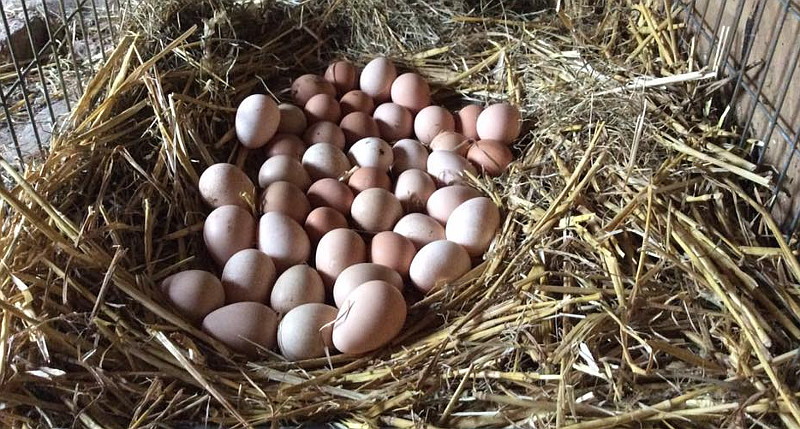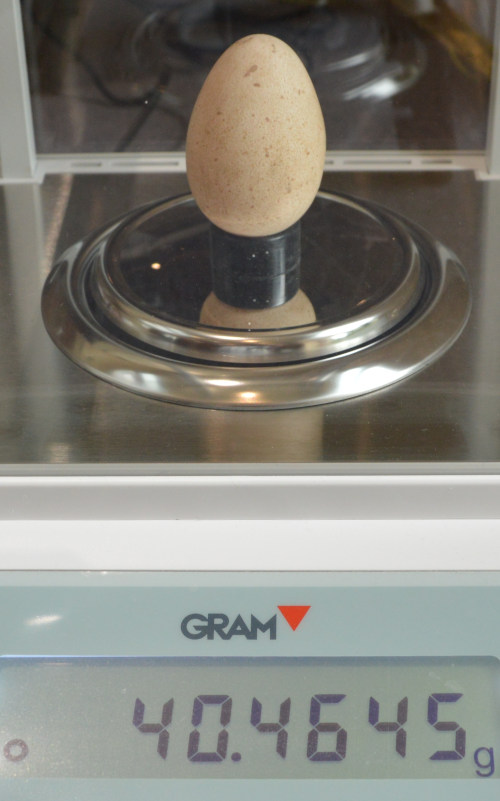Guinea fowl eggs.

What do Guinea fowl eggs look like?
Guinea fowl eggs are similar to a chickens egg except that they are
- Much more pointed at one end.
- One third smaller than chicken eggs.
- The shells are much thicker and tougher.
- The yolks are a bigger proportion of the egg.
- The yolks are a bright yellow.
- The shells are white to light brown and speckled.
The eggs are more pointy than a chickens eggs. Guineas all lay roughly the same sized egg and in similar numbers, the colour has no effect on laying ability.
Below: A Guinea fowl egg.

The eggs contain more a higher proportion of yolk to white and are very tasty.
Guinea fowl lay eggs in a season which is spring and summer. A Guinea fowl hen will lay between 80 and 160 eggs. They maintain this for 5 years or so when numbers begin to drop off. They are longer lived than chickens.
Guinea fowl egg statistics:
The Guinea fowl eggs I tested are on average:
- Were 42 grams in weight,
- 53 mm long,
- 39 mm wide,
- Contain 37 millilitres of contents,
- Have a surface area of 60 cm²,
- Have a shell thickness of 0.7 mm.
Below: Here is the video of me testing and measuring Guinea fowl eggs.
Video transcript: Today we are going to be looking at the vital statistics of Guinea fowl eggs. When we measure this one we will see they are about 53 mm long, and about 39 mm wide and that this one weights 43 and a quarter grams. The contents is almost exactly 37 millilitres. I can also tell you the shell of the Guinea fowl egg is just over 0.7 mm thick.
What do Guinea fowl eggs taste like?
Guinea fowl eggs taste very similar to a chickens egg and lack the stronger taste you might get from a ducks egg for example. In Guinea eggs the white is firmer and the yolks are richer both in colour and texture.
We did a blind taste test and my friends could not tell the difference between a chickens egg and a Guinea fowl when blindfolded.
Below: A selection of Guinea eggs.

They can be used in baking and 10 Guinea fowl eggs roughly equals 7 chicken eggs.
The Guinea egg is my personal favourite as I have a thing for yolks and poached eggs and they have big yolks and poach beautifully.
Are Guinea fowl eggs good to eat?
You can eat Guinea eggs, they are delicious, easy to cook and can be used in any recipe you would use chickens eggs in. Guinea eggs have been shown to have similar nutrient values to chickens eggs despite being smaller.
Below: This Guinea fowl egg weighs 40.4645 grams.

You need to increase the number you use because they are smaller than hens eggs.
Because of the solid whites they make excellent poached eggs.
How much of a Guinea fowl egg is water?
60% of a Guinea fowl egg is water.
| Component parts | Before drying (g) | After drying (g) | Weight loss (g) | Percentage |
| Shell | 5.8999 | 4.4343 | 1.4656 | 24.841099001678 |
| Yolk | 13.1809 | 8.507 | 4.6739 | 35.4596423612955 |
| White | 20.6092 | 2.945 | 17.6642 | 85.7102653184015 |
| Totals | 39.69 | 15.8863 | 23.8037 | 59.9740488788108 |
We separated a Guinea egg into its parts and desiccated to constant mass and then weighed them on an analytical balance.
The shell was 25% water, the yolk was 35 % water and the egg white was 86% water.
When do Guinea fowl start laying eggs?
A Guinea fowl can start laying eggs as early as 24 weeks old but it is more likely to be between 30 and 34 weeks of age.
It is unlikely that a bird will begin to lay in the year it was raised in. As the days shorten in the fall (Autumn) a young bird will wait to begin to lay eggs until the following year. This is true of most birds, it doesn't make sense to reproduce just before winter.

The average in my experience is 30 to 34 weeks.
How much do Guinea fowl eggs cost?
Guinea fowl eggs for eating can cost as much as $1 each if you buy them from the store but a backyard keeper can produce one for around 25c.
Guinea fowl eggs are more seasonal than chickens eggs and only available in spring and summer.
We only have one commercial produce of Guinea fowl eggs in the UK and they charge £3.99 for 4 eggs.
When do Guinea fowl stop laying eggs?
Guinea fowl are seasonal layers, starting in spring around March and finishing about September. Ultimately it will depend a little on the age and condition of the bird and the weather and climate of your location.
They have a habit of laying in clusters of around 30 eggs in succession, 4 times a year with a break in between.
They slow down producing eggs from their 5 year and stop altogether by year 8 even though they may live for 15. My oldest is 11.
How many eggs does a Guinea hen lay in a year?
A Guinea hen will lay between 80 to 160 eggs per year. It is very variable and depends on whether they were broody or not and how much they have been disturbed.
You wouldn't think so because of the noise they make but Guineas prefer a quiet life with not to many disturbances.
Can you make Guinea fowl lay longer with extra light?
Yes, it is done were they raise Guineas commercially for eggs.
You can extend the laying period of Guinea fowl by adding light to their coop in the mornings to get them up and feeding earlier. Supplemental light is always given in the morning to wake the bird rather than at night when the Guineas would be left on the coop floor in darkness and unable to roost.
It certainly would not be financially viable for the average backyard producer but if you really wanted eggs you could bring spring forward for some young birds in a large barn by giving extra light.
Guinea fowl egg laying habits:
The Guinea hens like to lay eggs in secluded nests on the ground. In season they will lay an egg a day coming home each night to roost as normal. Once there is a clutch of 20-30 eggs, a Guinea hen might decide to go broody, then she will stay on the nest.
Instinct will tell a guinea hen to lay her eggs in a secluded, well hidden spot. It’s their nature to share nests, so the clutch will build rapidly.
Once the nest accumulates 25-30 eggs, one or more guinea hens might decide to go broody on the same nest.
A good broody Guinea hen will stay put day and night for the duration (26-28 days) other than to leave the nest for food and water usually no more than twice daily, and usually not for longer than 20 minutes at a time.
They are generally more determined sitters than chickens unless they are disturbed, one small incident disturbing a sitting guinea can result in the leaving the nest.
They are also happier than some hens to leave the nest twice a day for feed and water etc. Some hens have to be lifted of the nest or they would die on but this never seems to happen with guineas.
Can you make a Guinea fowl start laying eggs?
No, they will start when they are good and ready, Guineas raised in late summer often won't start until the following spring.
It is possible that the first hatch of the year may go on to produce eggs in the same season but I would not plan for it.
Will Guinea hens lay eggs without a male?
Yes, Guinea hen will quite happily produce their eggs without having a male around. Guinea eggs do not need to be fertilised.
I have an egg flock of 27 guinea hens with no males at all and they regularly produce 25 eggs a day in season. They are not any quieter without the boys around as it might be with chickens, they still make a racket.
